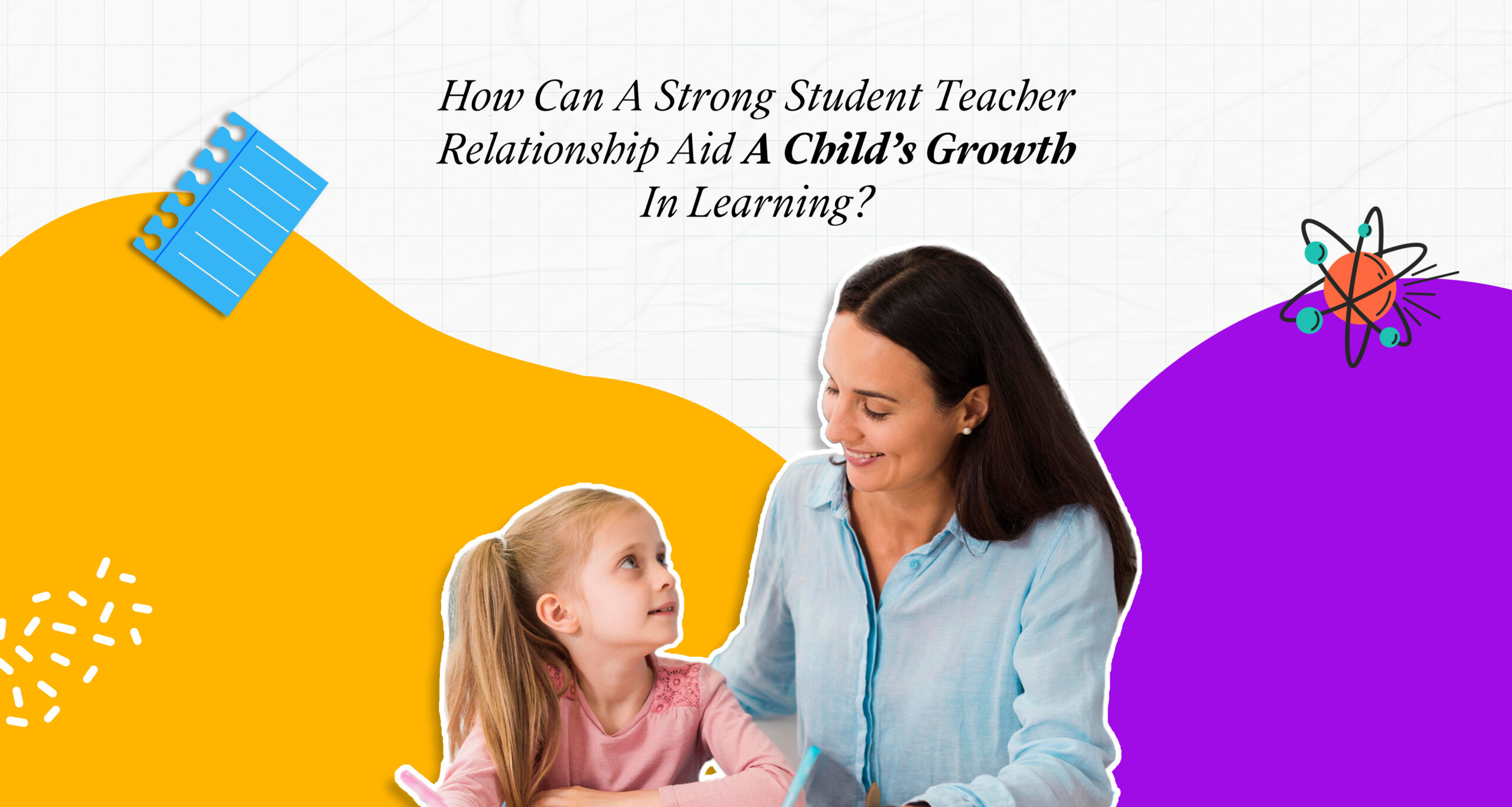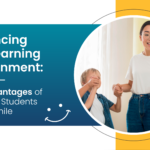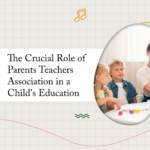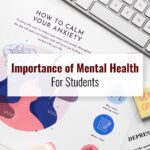
How Can A Strong Student Teacher Relationship Aid A Child’s Growth In Learning?
Table of Contents:
- Introduction
- The importance of student teacher relationship for academic learning
- Ways to improve student teacher relationship
- The Last Line
Introduction:
Let’s take a trip down the memory trail where your favorite teacher from high school left a distinctive imprint for years to come. That must have undoubtedly brought a smile, right? That’s the kind of influence an impactful student teacher relationship can create.
So, what made them so unique? Perhaps they made the most complicated Trigonometry lessons effortless to grasp. Or maybe it was that English Ma’am from your sophomore year whose teaching made you inclined to literature.
To quote the words of Heidi McDonald,
“My teacher gave me the best gift of all: Believing in me!”
The aforesaid quote truly captures the impact an excellent teacher may have on a student’s life. By fostering faith, boosting self-assurance, and enabling learners to fly high toward their goals, a great tutor truly has the capacity to radically transform a student’s life.
A student will be more likely to excel if they are more self-driven as they take up learning. Establishing consequential student teacher relationships is the best approach to achieving the goal.
Through this blog, let’s wade through to learn how a strong student teacher relationship can aid a child’s growth in learning.
The importance of building teacher student relationship for academic learning
An effective academic learning environment is dependent on the teacher and student relationship. It entails building teacher student relationship founded on strong, empathetic, and respectful principles.
Why is a positive student teacher relationship crucial for impactful academic learning? Let’s explore the reasons.
Motivation and Engagement
A strong student and teacher relationship serves to foster students’ motivation and involvement in their educational endeavors. Students are more likely to be excited about learning, participate actively in class discussions, and show an interest in the subject matter when they feel a connection to their teachers.
Emotional Well-being
Teachers have a big impact on how emotionally well kids are. A great student teacher relationship can foster an environment where kids can express themselves, deal with challenges, and handle stress in a healthy way.
Trust and Support
For learning to be successful, trust must be established. Students are less afraid to ask for guidance when necessary, express their thoughts and opinions, and take chances in their academic work when they feel their teachers understand and encourage them.
Role Modeling
For their students, teachers act as role models. Students’ attitudes and behaviors toward learning can be shaped through supportive and good relationships with their instructors. Thus, ending up with better study habits and a lifelong love of learning.
Long-term Impact
Beyond their academic years, children might benefit from a positive student-teacher relationship. It can inspire students to pursue higher education, strengthen their sense of self-worth, and cultivate a drive for lifelong learning.
Behavioural Management
A positive relationship between students and their teacher may have a positive impact on their behavior. Students are more inclined to adhere to classroom rules and regulations when they respect and regard their teacher, creating a more favorable learning environment for everybody.
Increased Academic Achievement
Positive student-teacher interactions are consistently linked to greater academic accomplishment, according to research. Students perform better, exhibit greater attendance rates, and are more ready to deliver assignments on time when they feel connected to their teachers.
Ways to Improve Student Teacher Relationship
Forging a solid and successful student-teacher relationship is essential to promoting an inviting atmosphere for learning. Listed below are some realistic recommendations for enhancing the student and teacher relationship:
Empathy as well as understanding
Try to understand the challenges and obligations that students must face. Be understanding and encouraging to them whenever they endure challenges or personal difficulties.
Active Listening
Pay close attention to what students say, both academically and emotionally. Display an honest interest in their perspectives, concerns, and opinions. Active listening helps students feel valued and understood.
Positive Discipline
Recognize and praise children’s efforts and successes, no matter how big or small they are. When teachers give positive feedback, students are inspired to keep trying and succeed.
Respect and Courtesy
Treat students with respect and kindness. Create a classroom culture where everyone’s opinions and feelings are respected, regardless of differences in perspectives.
Be accessible
Encourage students to approach you with questions or concerns by maintaining an open door approach. Make yourself accessible to kids if they require further assistance or simply want to chat during office hours or after school.
Employ Fun and Humour
Incorporate humor and fun activities into your lessons. A lighthearted approach can foster a more relaxed and engaging learning environment.
Include Parents/Guardians
Stay in regular touch with parents or guardians to discuss their child’s development and concerns. Participating in the educational process with them makes the student’s support system stronger.
Acknowledge cultural divergences
Always respect cultural differences among your students. Celebrate diversity and advocate for inclusivity in the classroom.
Be adaptable
Recognize that every student may have unique requirements and situations. Be flexible and versatile in how you handle things to deal with their various needs.
Remember that it takes time and effort to build a strong student-teacher relationship. You can foster a supportive and encouraging learning environment that supports your students’ academic and personal development by showing them that you genuinely care about, respect, and encourage them.
The Last Line
Effective academic learning requires a positive student-teacher rapport. When teachers put forth the time and effort to develop close relationships with their students, a positive and dynamic learning environment that fosters development, engagement, and academic success is established.
Also Read : Importance of Infographics in Education
Frequently Asked Questions (FAQs)
Q1: What is a student-teacher relationship? Why is it important for a child’s learning?
A strong student-teacher relationship refers to the positive and supportive bond between a student and their teacher. It calls for mutual respect, trust, communication, and understanding.
Having such a connection is essential for a child’s education since it fosters an environment that is suitable for both teaching and learning. A child is more likely to participate in the learning process and do better in school when they feel appreciated, secure, and cared for by their instructor.
Q2: Why is it important for teachers to build relationships with students?
It takes more than just being friendly to develop relationships with students. A competent teacher must make sure that the classroom is a secure, nurturing place where the pupils can flourish academically, socially, and emotionally. Teachers who devote the time and effort to develop sincere relationships with their pupils are more likely to achieve long-term success.
Some of the key effects of positive student teacher relationships are-
- It enhances the learning environment.
- It increases student engagement.
- It contributes to fostering trust and respect.
- A supportive teacher can help alleviate feelings of anxiety and stress by creating a more positive and enjoyable learning experience.
- Effective teacher-student relationships facilitate open communication.
Q3. Can a positive student-teacher relationship result in improved behavior and classroom management?
It is true that a positive student-teacher relationship can strengthen a child’s behavior and classroom performance. Children are more likely to adhere to the regulations and expectations in the classroom when they respect and trust their teachers. By establishing trusting relationships with their students, teachers may put effective behavior management strategies into practice. And redirecting inappropriate conduct in a constructive way.
Q4. Can a constructive student-teacher relationship improve a child’s self-esteem and confidence in the classroom?
Yes, a positive student-teacher relationship can help a child feel more confident and self-assured. When a teacher acknowledges and applauds a student’s efforts and accomplishments, it improves their sense of self-worth. A supportive instructor can also help learners overcome obstacles by offering direction and assurance. Thus, in return, it increases their confidence in taking on new challenges and subjects.
Q5. What effect does a positive student-teacher relationship have on a child’s willingness to learn?
A positive relationship with the teacher can significantly impact a child’s motivation to learn. A child is more likely to be excited about learning when they feel their instructor is there to help and encourage them. A solid relationship can help students feel like they belong in the classroom. Thus, encouraging them to participate actively, ask questions, and take risks in their academic endeavors.
 AIR CONDITIONED
AIR CONDITIONED




